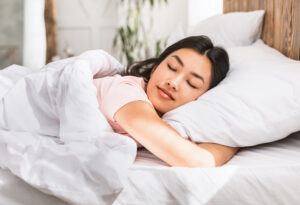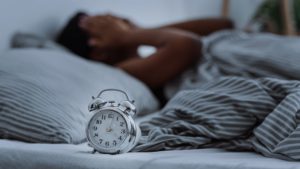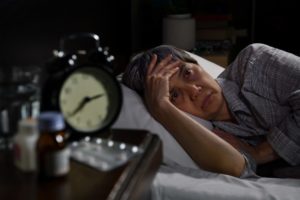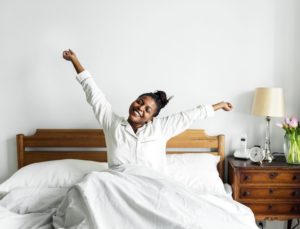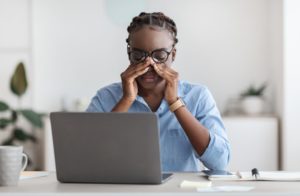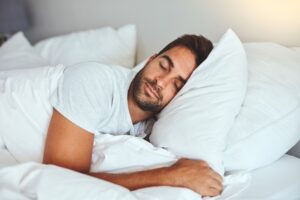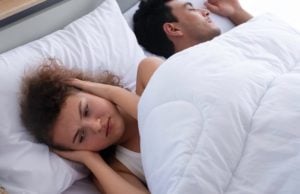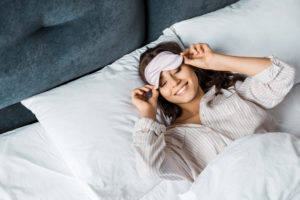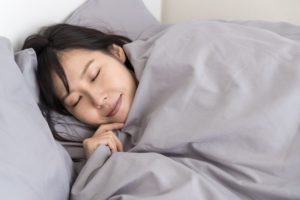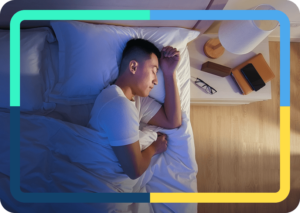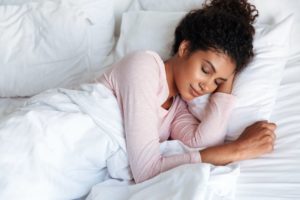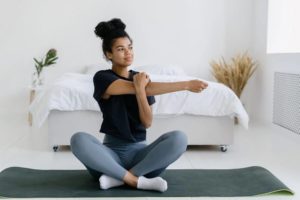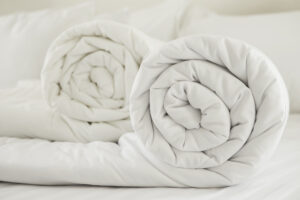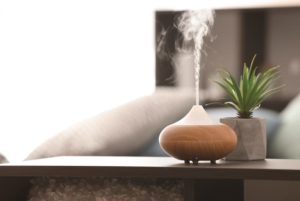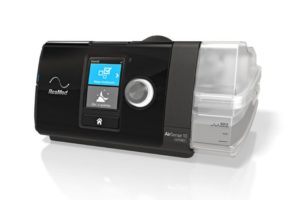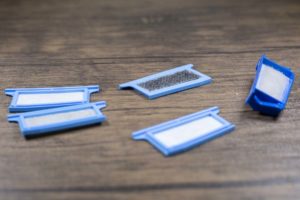When you buy through our links, we may earn a commission. Products or services may be offered by an affiliated entity. Learn more.
How Is Sleep Quality Calculated?
While it’s known that sleep quality is important to overall health, there is no one definition of sleep quality set by sleep experts. Instead, sleep quality is often defined by sleepers themselves. There are many consistent factors sleepers report when evaluating whether or not they get quality sleep, including sleep disturbances, bedroom environment, and daytime sleep habits. Daytime experiences, such as feeling rested and restored after waking also influence whether or not someone feels they have had quality sleep.
However, sleep quality and sleep quantity are not directly associated. In other words, people may sleep for a long period of time, but it may be disturbed sleep and therefore not considered quality sleep. Although sleep quality and quantity are different measures, both are affected by sleep hygiene.
Why Is Sleep Quality Important?
Sleep quality is important for a number of reasons. Just like breathing, eating, and drinking, sleep is an essential human need. It affects one’s ability to feel rested and energized for the next day and decreases daytime sleepiness. Quality sleep supports mental and physical health and contributes to the overall quality of life.
Sleep also contributes to human growth. For this reason, infants, children, and teens need more sleep than adults. People of all ages need sleep to prevent sickness or recover from illness or injury.
Poor sleep quality and sleep deprivation can have many negative effects. These can be physiological, including increased risk for stroke, heart disease, and high blood pressure. Negative effects can also be psychological, such as increased irritability or development of anxiety or depression.
A lack of quality sleep can even impact your safety or the safety of others. For example, driving while sleep-deprived can lead to an accident, injury, or even death.
Looking to improve your sleep? Try upgrading your mattress.
What Factors Affect Sleep Quality?
Failure to practice good sleep hygiene can affect sleep quality. Some other common factors are:
- Irregular sleep schedule: Going to bed and waking up at the same time each day can improve sleep.
- Sleeping environment: The bedroom should be quiet and dark without excessive lights. Blue light from electronics such as TVs, computers, and phones enhances alertness and should be avoided some hours before bedtime.
- Drinking too much caffeine or alcohol: These beverages can interfere with one’s ability to fall asleep or stay asleep.
- Drugs: Some prescription drugs, such as diuretics, increase the need to go to the bathroom, which can wake users up during the night. Sleep aids, whether over-the-counter (OTC) or prescribed by a doctor, can cause daytime sleepiness and other side effects.
- Snoring: While some snoring is normal, excessive snoring can affect the sleeper or the partner of the sleeper. This type of snoring may be asymptom of obstructive sleep apnea (OSA).
- Sleep disorders: Disorders like insomnia can cause difficulty in falling or staying asleep and lead to poor sleep quality. Frightening dreams and frequent arousals, which can affect sleep quality, are among the nighttime symptoms of narcolepsy.
Other factors, such as diet, stress, exercise during the day, travel, and other pains or illnesses can all impact your quality of sleep.
How Can You Calculate Your Sleep Quality at Home?
To calculate your sleep quality at home, you can begin by answering some basic questions about your sleep habits.
How Long Does It Take You To Fall Asleep?
While the amount of time it takes someone to fall asleep can vary, regularly taking longer than 30 minutes to fall asleep is an indicator of poor sleep on the Insomnia Severity Index.
How Long Are You Asleep in Bed?
People who spend less than 85% of their time in bed not sleeping have poor sleep efficiency.
How Often Do You Wake up During Sleep? For How Long?
For quality sleep, it should take less than 20 minutes to fall asleep again.
You should also consider questions about your waking and daytime habits, including:
- Do you have difficulty getting up in the morning?
- Do you have difficulty staying awake or concentrating during the day?
- Do you doze off or find yourself napping frequently?
It is often helpful to keep a sleep diary to answer these questions and take notes of your sleep after you wake up each morning and write down your habits and activities of the day before bedtime. The sleep diary can help you identify factors personally affecting your sleep. You can then make adjustments to your habits if possible or share your observations with your doctor for professional guidance.
How Do Professionals Evaluate Sleep Quality?
If you feel like you’re not getting quality sleep, you are not alone. To ensure you get quality sleep, you can create a sleep-friendly environment, practice good daytime habits, and implement other strategies for healthy sleep.
If your difficulties with achieving quality sleep persist, consult your doctor for additional strategies. Professionals can evaluate sleep quality through sleep studies and instruments such as the Pittsburgh Quality Sleep Index (PSQI). The PSQI is a series of questions about sleep-related behaviors and is used in both clinical and research settings. Patients provide self-rated responses to questions in seven categories, including sleep quality, sleeping disturbances, and daytime dysfunction. Professionals evaluate the responses to the questions and identify the next steps in improving the patient’s quality of sleep.
Sleep tests may be necessary if sleep disorders such as sleep apnea or narcolepsy are suspected. A common test is a polysomnography, where patients are observed overnight in a sleep laboratory. Other tests are multiple sleep latency tests, where the patient’s ability to fall asleep is measured, the maintenance of wakefulness test, to determine the severity of daytime sleepiness, and other evaluations of the liver, heart, and lungs.
However, because sleep quality is largely self-evaluated, these tests cannot explicitly measure the quality of sleep the patient has. Instead, these tests provide data and observations about the sleep itself and can reveal any irregularities in sleep behavior that may be contributing to overall poor sleep quality.
References
9 Sources
-
National Heart, Lung, and Blood Institute. (n.d.). Sleep deprivation and deficiency., Retrieved December 21, 2020, from
https://www.nhlbi.nih.gov/health-topics/sleep-deprivation-and-deficiency -
MedlinePlus: National Library of Medicine (US). (2014, April 14). Healthy Sleep., Retrieved December 21, 2020, from
https://medlineplus.gov/healthysleep.html -
Schwab, R. J. (2020, June). Approach to the patient with a sleep or wakefulness disorder. Merck Manual Professional Version., Retrieved December 21, 2020, from
https://www.merckmanuals.com/professional/neurologic-disorders/sleep-and-wakefulness-disorders/approach-to-the-patient-with-a-sleep-or-wakefulness-disorder -
Schwab, R. J. (2020, June). Merck Manual Consumer Version: Overview of Sleep., Retrieved December 21, 2020, from
https://www.merckmanuals.com/home/brain,-spinal-cord,-and-nerve-disorders/sleep-disorders/overview-of-sleep -
Schwaub, R. J. (2020, June). Merck Manual Consumer Version: Snoring., Retrieved December 21, 2020, from
https://www.merckmanuals.com/home/brain,-spinal-cord,-and-nerve-disorders/sleep-disorders/snoring -
Schwab, R. J. (2020, June). Insomnia and excessive daytime sleepiness (EDS). Merck Manual Consumer Version., Retrieved December 21, 2020, from
https://www.merckmanuals.com/home/brain,-spinal-cord,-and-nerve-disorders/sleep-disorders/insomnia-and-excessive-daytime-sleepiness-eds -
Schwab, R. J. (2020, June). Narcolepsy. Merck Manual Professional Version., Retrieved December 21, 2020, from
https://www.merckmanuals.com/professional/neurologic-disorders/sleep-and-wakefulness-disorders/narcolepsy -
Reed, D. L., & Sacco, W. P. (2016). Measuring Sleep Efficiency: What Should the Denominator Be?. Journal of clinical sleep medicine: JCSM: official publication of the American Academy of Sleep Medicine, 12(2), 263–266., Retrieved December 21, 2020, from
https://pubmed.ncbi.nlm.nih.gov/26194727/ -
Buysse, D.J., Reynolds, C.F., Monk, T.H., Berman, S.R., & Kupfer, D.J. (1989). The Pittsburgh Sleep Quality Index (PSQI): A new instrument for psychiatric research and practice. Psychiatry Research, 28(2), 193-213., Retrieved December 21, 2020, from
https://www.psychiatry.pitt.edu/sites/default/files/inline-files/PSQI%20Article.pdf



